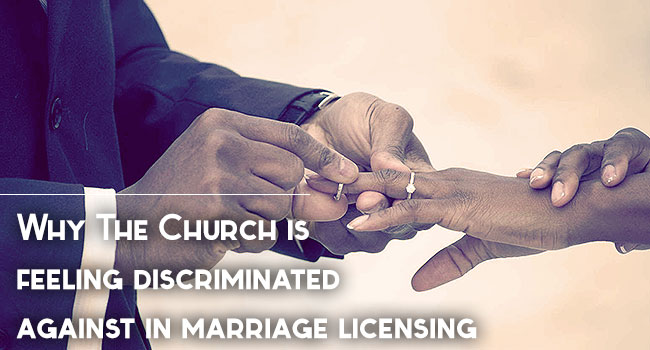Why the Church Feels Discriminated Against in Marriage Licensing

The recent directive by the Attorney General's office that Church ministers must apply for new licenses to conduct marriages under the new Marriage Act, seems to be causing disquiet among some members of the clergy. According to the directive, all licensed ministers are to return marriage certificate books issued under the old law by November 1, failure to which they will have their licenses cancelled. In a recent meeting with the Registrar General, the clergy were informed that the new marriage certificate books would cost Ksh. 25,000/-. Furthermore, all licensed ministers of faith are required to apply to the Registrar of Marriages for renewal of license or for new licenses, for which they also have to pay. It is these requirements that seem to be rubbing the men of the cloth in the wrong way, and for several reasons.
According to the new law, those authorized to celebrate marriages include duly licensed ministers of faith, in the case of Christian and Hindu marriages; Kadhis, sheikhs and imams, in the case of Muslim marriages; or the director of marriages in the case of civil and traditional marriages. The observation of the Church is that only the Christian and Hindu clergy are required to apply and pay for their licenses. This is because kadhis, under the new constitution, are state officials duly hired and paid by the government. This means that for a kadhi to celebrate a wedding, he is not only not required to seek and pay for a license, but is instead paid a salary for conducting the wedding. On the other hand, the Church pastor is not only required to pay to be licensed, but must also purchase the marriage certificate books used in the marriage ceremony. Some members of the Church are seeing this not just as an anomaly, but also as a serious act of religious discrimination. It is thus rekindling the memories of the arguments that the Church presented during the constitution review process against singling out one religion over others for inclusion in the constitution, and for appointing its religious leaders as government officers.
The other factor that is making the requirements contentious is the observation that the registration of marriages is purely a legal and therefore a government function. It is the duty of the government to ensure that all marriages conducted within the country are legal and therefore duly registered. On the other hand, the Church views marriage purely as a spiritual ordinance instituted by God. Thus the pastor officiating a wedding does so on behalf of God who brings the two parties into the holy estate of matrimony. There is no register required for this ceremony, other than the covenant made before God by the parties involved and the prayers offered by the minister to bless the couple. The registration of the marriage at a church wedding is therefore conducted only on behalf of the government. That is why in many churches, the signing of the register is never done at the altar but rather at the church office, or at a table set aside for the same.
Consequently, the argument among some clergy is that the officiating ministers should not be charged for performing a government duty. If anything, they should not only be duly compensated for it, but the marriage certificate books should also be supplied by the government for free. Furthermore, there is the legitimate argument that, whereas the amounts involved in the licensing of ministers and the purchase of books may appear small for large congregations, there are thousands of small churches in the villages of Kenya who simply cannot afford such figures. It means that their pastors and members are placed at a disadvantage if they must pay for the licenses and purchase the books.
What seems apparent from these arguments is that the government needs to review the provisions of the new marriage act and the rules that govern its implementation so as to assuage the rising concerns by the members of the clergy and their followers. Furthermore, it is clear that whereas the Church's voice was silenced at the referendum of 2010, the issues that were of concern did not necessarily die with the promulgation of the new constitution. Many of these keep rearing their ugly heads every so often, in ways very similar to what the Church had feared. Pushing them back under the carpet may not be the ultimate solution as they will only keep simmering below the surface. The relevant authorities may need to take the bold step and accept that there are factors that need addressing. Otherwise, with the prevailing trend of individually initiated referenda, it would be a pity to see the Church forced to also initiate its own Haki ya Wakristo referendum.
by David Oginde ( This email address is being protected from spambots. You need JavaScript enabled to view it. )
Article originally appeared on the Sunday Standard, 5th October 2014
Reprinted with Permission


